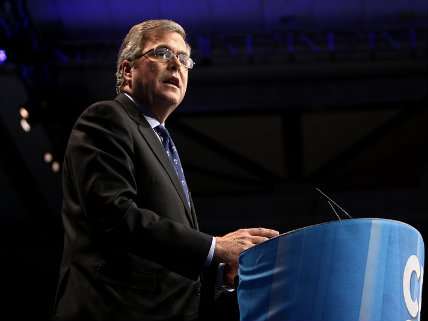Jeb Bush Says NSA Surveillance is "the best part of the Obama administration"

It's reasonably rare for potential Republican presidential candidates to compliment the Obama administration, so any time they do, it ends up being fairly revealing.
For example, when former Florida Gov. Jeb Bush—who is currently in the process of "actively exploring" a presidential run—was asked yesterday for his thoughts on "the best part of the Obama administration," he singled out the president's continuation and enhancement of the National Security Agency's bulk phone records surveillance program:
Jeb Bush: I would say the best part of the Obama administration would be his continuance of the protections of the homeland using the big metadata programs, the NSA being enhanced. Advancing this — even though he never defends it, even though he never openly admits it, there has been a continuation of a very important service, which is the first obligation, I think of our national government is to keep us safe. And the technologies that now can be applied to make that so, while protecting civil liberties are there. And he's not abandoned them, even though there was some indication that he might.
(Via Breitbart's Ian Hatchett/Glenn Greenwald at The Intercept)
Bush's aggressive defense of the program, continued from his brother George W. Bush's administration, stands in marked opposition to the promise made by Sen. Rand Paul (R-Ky.) during his presidential campaign announcement speech that he'd put an end to the NSA's intrusive surveillance program on day one in the White House. Indeed, the strong statements from both Paul and Bush set up a nice contrast for the GOP as it heads into the 2016 primary season, and a kind of a test, an opportunity for the party to openly debate a major issue that divides the base.
That debate, meanwhile, promises to tell us a lot about the state of the GOP in 2015, and how much it has really changed since the last time a Republican sat in the White House.
Over the last few years, prominent members of the party and key parts of its voter base have made some halting but interesting moves to put distance between themselves the Bush administration and take a more strongly critical line on executive overreach, especially as wielded by President Obama.
The NSA's bulk surveillance program is something the Obama administration has not only continued from its Republican predecessor, but, as Jeb Bush says, arguably "enhanced," despite continued concerns about both its constitutionality, its privacy safeguards, and its practical value. Clear Republican opposition to NSA surveillance would be a pretty strong signal that the party is actually committed to some of these shifts in direction.
The question for the Republican party, then, will be whether it gives up and sides with two Bushes and Obama in favor of an intrusive, secretive, ineffective, and constitutionally dubious mass surveillance program—or whether it takes its break from the Bush years and its critique of executive overreach seriously.


Show Comments (108)